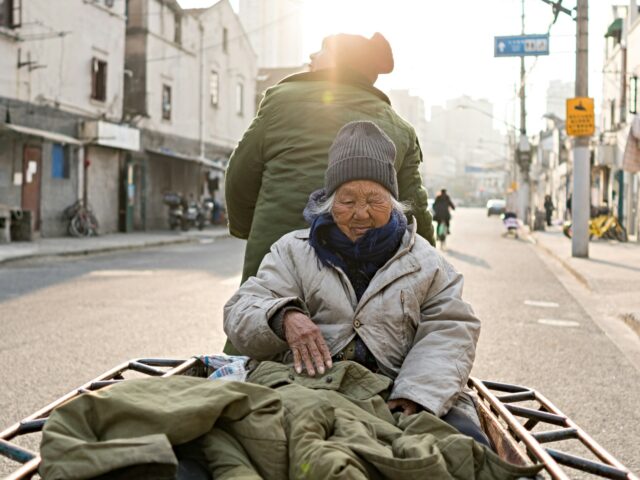The Chinese government newspaper Global Times highlighted a growing trend in the country on Sunday of refurbishing kindergarten facilities into nursing homes, or adding amenities for seniors to children’s play and education sectors, as a way to participate in the “flourishing silver economy.”
The state newspaper described the trend as a “forward-thinking” and “creative” way to address the growing unpopularity of “private” kindergartens – in reality, private institutions do not exist under communism – allegedly due to the increased quality of government kindergartens. China is facing a dramatic decline in its birth rate, however, that has left it with a shrinking population and the prospect of becoming a “severely aging society” by 2035.
Declining birth rates are in part the product of a decades-long “one-child policy” that led to the killing of 400 million children until the government began allowing couples to have two children in 2016. The Communist Party has since expanded permissions to three children and has loosened enforcement of the child policy to encourage the development of large families, but national fertility has remained at record lows, particularly after the Wuhan coronavirus pandemic.
The latest birth rate statistics, covering 2023 and published by the National Bureau of Statistics in January, found that China’s population dropped by over 2 million people that year. The government documented the birth rate at 6.39 babies per 1,000 women, far below the necessary number of births to sustain the current population. Conversely, demographic experts predict that China will see an increase of over 400 million people over 60 years old by 2035, a prodigious challenge to sustaining the nation’s workforce, social programs, and greater economy.
The Global Times nonetheless described the emergency of nursing homes at the sites of former kindergartens as a success for the Communist Party system, profiling a former kindergarten in Zhejiang province that received significant government funding to refurbish as a nursing home. Zhuang Yanfang, the owner of the facilities, was reportedly “facing a prolonged struggle to enroll enough children” when approaching the regime for help to renovate the school into a nursing home.
“The alteration work started in July 2023 after the last batch of children graduated. It lasted four months, turning the previous classrooms into bedrooms for the elderly,” the state newspaper narrated, “and installing an elevator, armrests, ship-and-galley tiles, and an alarm system. For those with mobility problems, Zhuang equipped all the bathrooms with portable seats, and added emergency buttons to the bedsides.”
The Global Times identified four other locations nationwide that had stopped serving kindergarten students and noted that the government documented “nearly 5.35 million fewer kindergartners in 2023 than in the previous year.”
The state newspaper appeared to encourage kindergarten and early childhood educators, facing the prospect of diminished job opportunities as the birth rate collapses, to consider elderly care. One such teacher that made the career switch was quoted as saying that she treats the elderly “like encouraging little children.”
When they participate in an activity, when they are persuaded to eat a dish that they don’t like but is healthy, I would give them oral encouragement and praise,” the teacher said. “I would softly say, if you finish this bowl of rice, or if you exercise well today, I will give you a piece of chocolate.”
China is facing a dual social problem of encouraging couples to have more children while caring for a booming population of seniors, who have recently become a source of social unrest. As the Communist Party struggles to produce enough money to pay out pensions and offer suitable health care, “white hair” protests have become a growing trend. One of the largest such protests occurred in early 2023 in Wuhan, the origin location of the 2020 coronavirus pandemic, in which thousands of people, many of them seniors, took to the streets demanding the regime stop a planned reduction in healthcare benefits. Several of those who participated in the protests began disappearing without explanation shortly thereafter.
While protests become increasingly common among the elderly, Chinese Millennials have adopted a cultural trend known as “lying flat,” in which they abandon all ambitions in their personal lives, careers, and finances. Many Millennials, tethered home by the need to care for their older parents, have abandoned dating and jobs entirely, becoming “full-time children” tending to their parents’ home. The “lying flat” movement has become widely popular on social media, resulting in widespread government censorship on regime-controlled outlets. In July, Chinese censors began targeting an offspring trend to the “lying flat” movement – references to “garbage time,” a term typically used to describe the end of a basketball game when one team is too ahead to allow for any meaningful competition. Young Chinese began using the term “garbage time of history” to describe China as the inevitably losing team, its citizens watching the economy slowly and inevitably sink in the competition with America.
The Communist Party has proposed a variety of programs to encourage child-rearing – from subsidies to couples with newborns to subsidizing in-vitro fertilization and other fertility measures – but they have not at press time resulted in meaningful changes in demographic trends in the country.

COMMENTS
Please let us know if you're having issues with commenting.